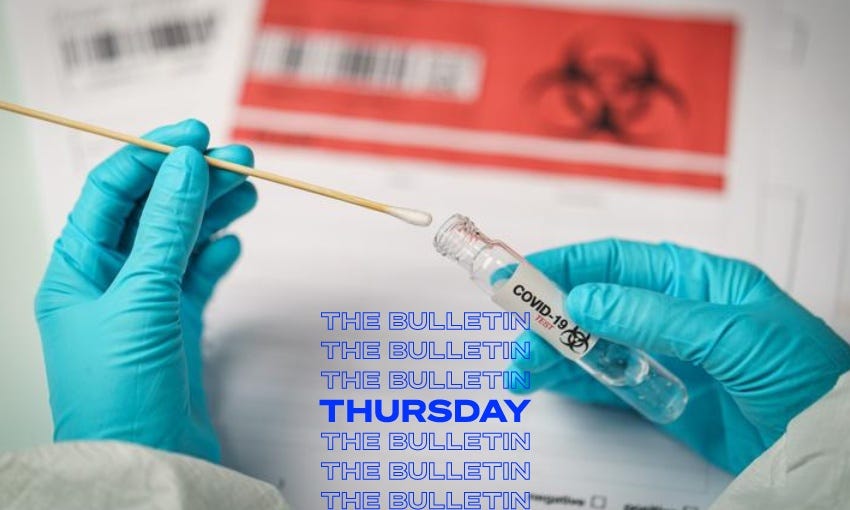'The whole system is under stress'
The country’s hospitals, from the front door to the ICU, are struggling to keep up with omicron
Mōrena and welcome to The Bulletin for Thursday, February 24, by Justin Giovannetti. Presented in partnership with Z Energy.
In today’s edition: Phase three of omicron soon; reserve bank signals more hikes to come; Russian ambassador warned of punishment; but first, how prepared is the hospital system for omicron?
The entire health system and not just ICU capacity should be our focus under omicron. (Image: RNZ/123RF)
Omicron will be a severe test of the country’s health system. Before omicron hit, a number of the country’s hospitals were at near-capacity the NZ Herald reports. Since Sunday, over 10,000 community cases of Covid-19 have been reported in New Zealand. What was witnessed when omicron appeared in other countries is now happening in New Zealand. While omicron often creates milder symptoms compared to earlier variants of Covid, the sheer number of cases can overwhelm healthcare systems. That sharp increase in cases is now being mirrored in hospitalisations, with 179 people in hospital as of yesterday. That’s nearly twice the number of hospitalisations reported during delta’s worst day and omicron is likely nowhere near its peak yet.
The Spinoff’s Covid data tracker has the latest figures.
The healthcare system has largely done all it can to prepare at this point. According to RNZ, some DHBs like Northland are preparing to erect field hospitals to deal with case numbers that could overwhelm existing wards. One positive bit of data is the lack of people in ICU, with only a single case reported—and that patient unfortunately is from the delta outbreak. There’s been a lot of focus on ICU capacity and what resources are available in the healthcare system. To get a better understanding, I spoke with Alex Kazemi, a doctor and formerly the clinical head of intensive care at Middlemore hospital about what’s happening. He made two important points.
Our focus shouldn’t just be on ICU at this point. With the high number of cases under omicron, every bit of healthcare from GP offices to hospitals will be tested. “The whole healthcare system operates close to capacity all the time and there’s not much slack, unfortunately. The whole system is under stress,” said Kazemi. “The focus has always been on ICU capacity because it was seen as a crunch point, but the strain is borne not just by the ICU, it's across a hospital, from the front door up to the wards. It’s a system-wide issue without an easy, short-term fix. These have accumulated over years and there’s nothing that can be done to turn it around quickly.”
Beds aren’t a good metric of what we’re facing in the coming weeks. Data from the OECD earlier this year showed that New Zealand has one of the lowest number of per capita hospital beds measured in the group. It was the second worst, only slightly better than Mexico. While that’s a sobering statistic, buying beds won’t make a difference in this pandemic. ICU doctor Alex Psirides has written for The Guardian about the missed opportunity to prepare New Zealand’s healthcare system for today’s challenge.
Here’s Kazemi again. “People become fixated on physical beds and physical infrastructure when the issue is human resource. It’s about staff. Healthcare is delivered by people, not machines. Those numerical arguments about beds don’t reflect the system and that’s what everyone within the healthcare system is trying to say. Valuing those people is the important part of the system,” he said. That already limited human capacity is likely to fall over the coming weeks as health staff catch Covid-19 and stay home.
His advice: Get vaccinated, get boosted, follow health advice.
A quick word. With omicron cases increasing and tensions running high, there has never been a greater need for trustworthy and freely accessible journalism. The generous support of our members powers all of The Spinoff's Covid-19 coverage, from live updates to the award-winning mahi of Toby Morris and Siouxsie Wiles. Tautoko mai, join The Spinoff Members today.
Phase three of omicron plan ‘soon’ as test waits grow. The country’s testing system is buckling under the pressure of omicron far earlier than expected. There are reports of wait times growing to a week, according to RNZ. In Auckland, people are largely getting rapid tests now, including The Spinoff’s Alice Neville, who wrote about the experience. With a phrase three announcement expected as early as today, Stuff writes about what phase three is all about.
Reserve bank signals more rate hikes to battle inflation. The reserve bank raised the official cash rate to 1% yesterday as widely expected, a move that increases the cost of borrowing across New Zealand. However as the NZ Herald reports, there was some surprise as the bank indicated plans to keep increasing the rate to 3.25% by 2024, significantly higher than its previous guidance. The reserve bank’s emergency stimulus programme is also being ended. Luke Malpass writes in Stuff that the end of the era of ultra cheap money could hit voters suddenly facing higher prices across the economy and higher borrowing costs on homes.
Russian ambassador to New Zealand warned of looming economic and diplomatic response. From a meeting in Paris, Nanaia Mahuta called the Russian ambassador to the foreign ministry to receive a warning after his government’s invasion of Ukraine, One News reports. Travel bans, export bans and diplomatic pressure are likely. The 27 EU members also unanimously voted yesterday to hit Russia with sanctions. Russia’s banks and elites now face stiff economic sanctions and the freezing of their overseas assets, according to Reuters.
Cabinet has made decision on RNZ merger with TVNZ. RNZ reports that cabinet discussed creating a new public media entity on Monday that would bring together the TV and radio networks. Sources told Stuff that the plan likely got approved. The expected outcome would create a new overarching entity to bring together the networks, while keeping their existing brands distinct for viewers and listeners.
Got some feedback about The Bulletin, or anything in the news?
Get in touch with me at thebulletin@thespinoff.co.nz
Right now on The Spinoff: Dylan Reeve reports on the Wellington businesses weighing up whether to act against the protest. Henry Rounce speaks with track cyclist Jordan Castle about an early retirement from elite sport. Gabi Lardies finds out what happens when a cyclist goes to a drive-through testing site. Rowan Nicholson explains how Russia is clearly breaking international law. Charlotte Muru-Lanning speaks with Starstruck’s Rose Matafeo about romance and romcoms.
Lisa Carrington wins top Halberg Award. Two years of sporting achievement was celebrated yesterday, with the golden Olympian taking the top award. Dame Sophie Pascoe, the Black Caps and Kane Williamson won as well. RNZ has the full list of winners.






